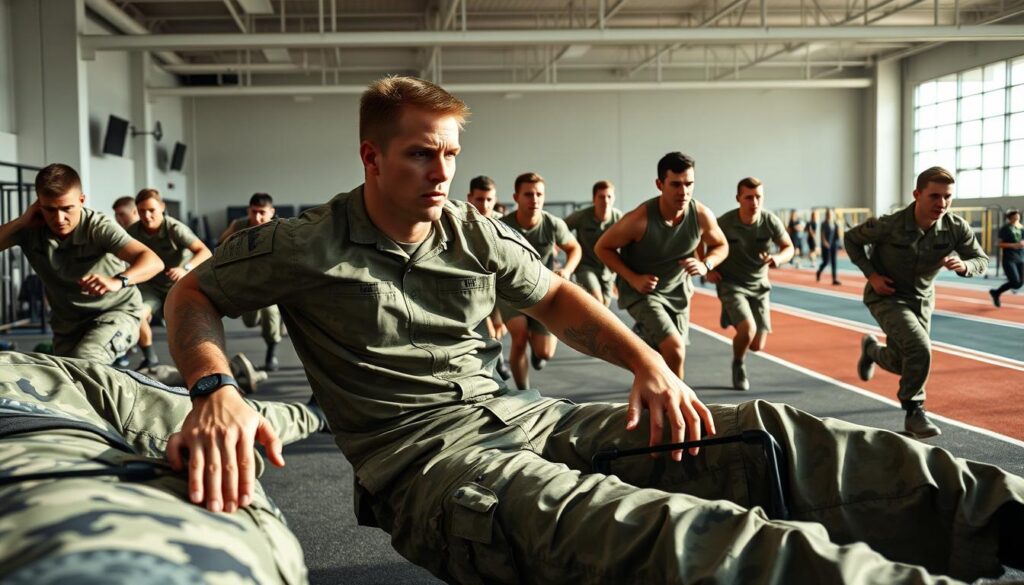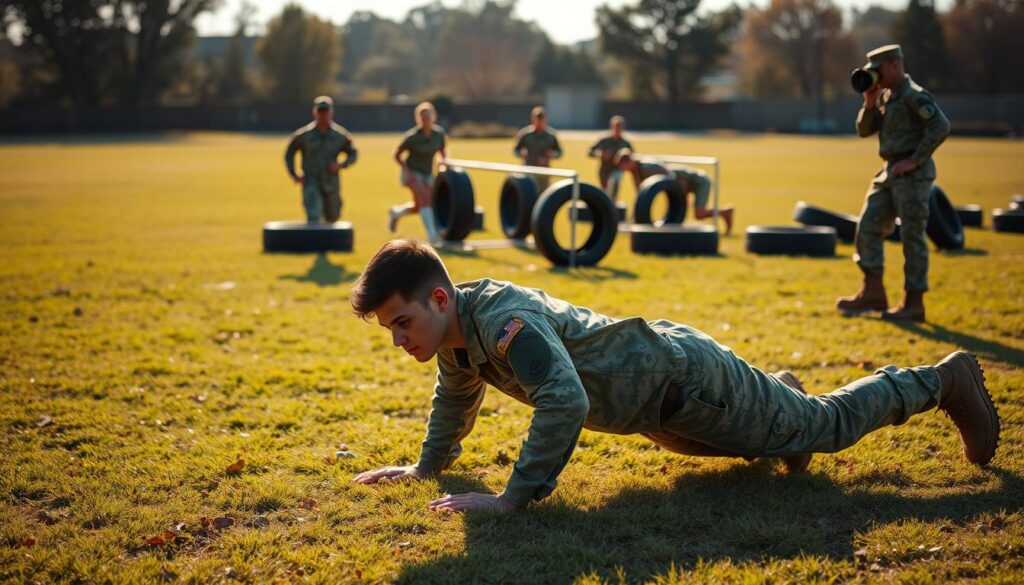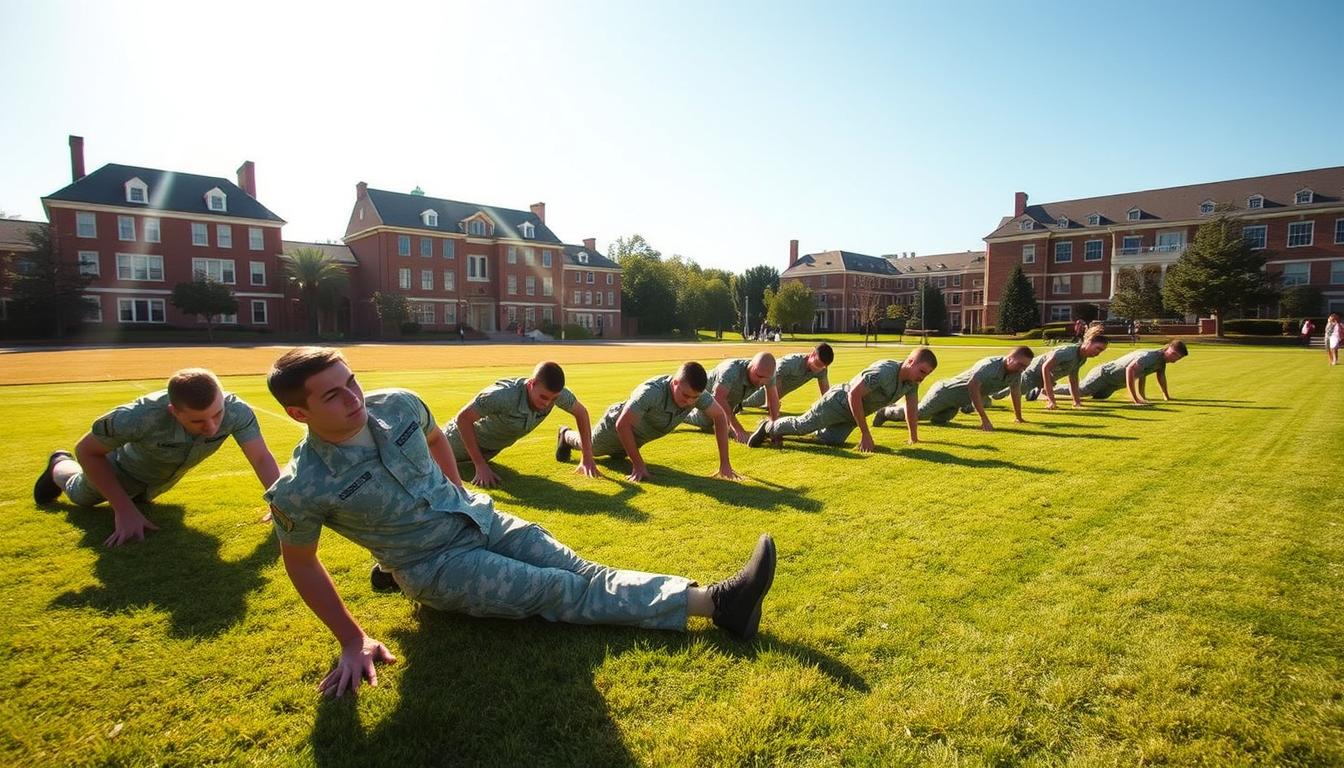Are you ready for the Army ROTC program? The fitness needs are key. They check if you’re physically fit and ready.
The physical fitness test has three parts: push-ups, sit-ups, and a 2-mile run. Each tests a different fitness area. Cadets must score well in all.
To pass, you need to know the fitness standards. A good workout plan is vital. It should have cardio, strength, and endurance exercises.
Key Takeaways
- Cadets must pass a physical fitness test to succeed in the Army ROTC program.
- The test includes push-ups, sit-ups, and a 2-mile run.
- Achieving a minimum score in each event is required.
- A well-structured workout plan is essential to meet the fitness requirements.
- Cardio, strength training, and endurance exercises are crucial components of the workout plan.
Overview of Army ROTC Fitness Standards
The Army ROTC program focuses on physical fitness. It has specific standards to prepare cadets for military service. It’s not just about passing tests; it’s about building physical and mental toughness.

Importance of Physical Fitness in ROTC
Physical fitness is key in ROTC. Cadets must stay fit throughout their time in the program. This means regular exercise, a healthy diet, and a good lifestyle.
The importance of physical fitness cannot be overstated. It helps cadets perform well under stress and recover from tough activities.
General Expectations for Cadets
Cadets must meet certain expectations. This includes staying physically fit, eating healthy, and avoiding harmful behaviors. The ROTC program pushes cadets hard, and being fit is crucial.
Cadets should be ready for regular workouts and assessments. The goal is to keep improving their fitness.
By meeting the Army ROTC fitness standards, cadets prepare for military service. They set themselves up for success in their future careers.
Physical Fitness Test Components
Knowing the Army ROTC physical fitness test is key for cadets. It checks their fitness and readiness for military life.

Push-Ups: Standards and Techniques
Push-ups test upper body strength and endurance. Cadets must do as many push-ups as they can in 2 minutes. They must keep the right form.
Proper technique means lowering the body until arms are parallel to the ground. Then, push back up to start.
- Keep the body in a straight line from head to heels.
- Lower the body until the upper arms are parallel to the ground.
- Push back up to the starting position.
Sit-Ups: Proper Form and Frequency
Sit-ups check abdominal strength and endurance. Cadets aim to do as many in 2 minutes. They must follow proper form.
This includes lifting the upper body to a vertical position with fingers interlocked behind the head.
- Lie on the back with knees bent and fingers interlocked behind the head.
- Lift the upper body to a vertical position.
- Lower the body back down to the starting position.
2-Mile Run: Training Tips and Goals
The 2-mile run tests cardiovascular endurance. Cadets aim to finish the distance as fast as they can. Training tips include adding cardio to daily routines.
Start with shorter distances and increase them. Use interval training to boost endurance. Practice running on different terrains.
- Start with shorter distances and gradually increase the length.
- Incorporate interval training to improve cardiovascular endurance.
- Practice running on different terrains to simulate various conditions.
Fitness Assessment Timeline
The Army ROTC fitness assessment timeline is key. It checks if cadets are ready physically. It makes sure they meet the Army ROTC fitness requirements and are good at ROTC fitness training.
Initial Assessment: What to Expect
The first test is a check of a cadet’s fitness level. They do push-ups, sit-ups, and a 2-mile run. For more on how it’s scored, see the PFT Scoring Information document.
Regular Fitness Evaluations Throughout ROTC
After the first test, cadets get regular checks. These tests make sure they’re improving and meeting the Army ROTC fitness requirements. They can use the Army Height and Weight Calculator to keep track.
These tests also check if cadets can follow a training plan. This is important for ROTC fitness training. By passing these tests, cadets show they’re serious about the program and can lead well.
Preparing for the Fitness Test
To succeed in the Army ROTC fitness test, a good training program is key. Cadets need to focus on cardio, strength, and endurance. This will help them meet the physical fitness standards.
Training Regimen for Success
Cadets should create a workout plan that covers all test areas. This includes push-ups, sit-ups, and the 2-mile run. Adding exercises like squats, lunges, and planks can boost fitness and test scores.
A sample workout plan might include:
- Cardio days: Running, cycling, or swimming to improve endurance.
- Strength training days: Focus on exercises like push-ups, sit-ups, and weight training to build muscle.
- Flexibility and endurance days: Incorporate stretching and endurance exercises to enhance overall fitness.
Nutrition Tips to Enhance Performance
Nutrition is crucial for cadets’ performance. Eating a balanced diet with proteins, complex carbs, and healthy fats is essential. Drinking plenty of water is also important.
Key nutritional tips include:
- Eating lean proteins like chicken, fish, and beans to support muscle growth.
- Including complex carbohydrates such as whole grains, fruits, and vegetables for energy.
- Staying hydrated by drinking water regularly throughout the day.
With a solid training plan and good nutrition, cadets can reach their best performance. They will meet the Army ROTC physical fitness standards.
Resources for ROTC Cadets
The ROTC program has many resources to help cadets reach their fitness goals. These tools are made to prepare cadets for the ROTC fitness assessment and meet military fitness requirements.
Fitness Apps and Tools
Cadets can use fitness apps and tools to track their progress and plan workouts. These apps offer personalized plans, exercise tracking, and nutrition advice. For example, there are apps that provide Army ROTC fitness requirements workout plans.
Access to Fitness Facilities
Cadets also have access to fitness facilities on campus. These places offer a great way to train with the right equipment and spaces. For more on staying fit, cadets can check out the official Army height-weight calculator to meet the standards.
| Resource | Description | Benefit |
|---|---|---|
| Fitness Apps | Personalized workout plans and tracking | Enhanced motivation and progress monitoring |
| Fitness Facilities | Access to equipment and workout spaces | Convenient and varied training options |
| Nutritional Guidance | Dietary planning and advice | Optimized nutrition for performance |
Common Challenges Cadets Face
Meeting Army ROTC fitness standards can be tough for cadets. They face a tough training schedule and must keep up with schoolwork. It’s key to know and tackle these hurdles.
Overcoming Physical Limitations
Physical challenges are a big obstacle for cadets aiming to meet Army ROTC fitness standards. Modifying exercises to fit their abilities can help. For example, those with injuries can swap out hard exercises for easier ones.
Getting advice from seasoned trainers or fitness experts can also help. They can offer tailored ways to boost performance in ROTC fitness training.
Proper recovery techniques are also vital. Adequate rest and nutrition are key to recovery and doing well in fitness tests.
Time Management for Training
Managing time well is crucial for cadets to balance school and ROTC fitness training. A structured training schedule keeps them on track. It ensures they meet fitness standards.
Using downtime wisely, like stretching during breaks, can also help. Staying organized and focused helps cadets manage their time better. This leads to success in ROTC fitness training.
Benefits of Meeting Fitness Requirements
Meeting Army ROTC fitness standards brings many benefits. It’s not just about passing the test. Cadets also see better mental health and overall well-being.
Physical and Mental Health Advantages
A good ROTC fitness program boosts physical health. It lowers injury risks and improves health overall. It also builds mental toughness, discipline, and resilience. These are key for cadets’ future success.
Impact on Leadership Skills and Confidence
Meeting fitness standards improves leadership and confidence. Cadets who do well in fitness programs are ready to lead. They make smart decisions under pressure, preparing them for military careers.
By sticking to a solid Army ROTC workout plan, cadets gain. They see better physical and mental health. Plus, they boost their leadership skills and confidence.


